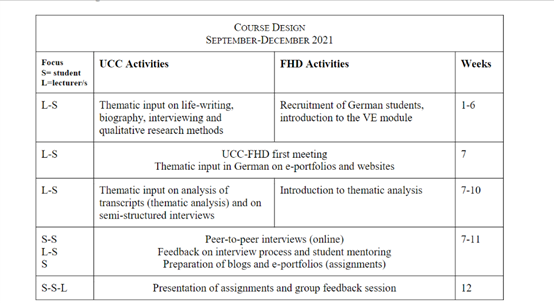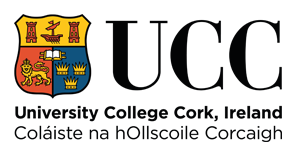Students received 10-credit points for fulfilment of a biographical project which involved carrying out interviews in the target language and engaging with qualitative research methods (first iteration in 2020/21). The module is commencing its fourth iteration in 2023/24.
Objective:
This module enables UCC students to work closely with a German student (at the Fachhochschule Dresden / Maik Arnold, or the University of Applied Sciences in Regensburg / Julia Buerger) and complete a life writing project virtually with them. Working closely with their peer, students will listen as their partner narrates their life-story in German, in turn, they will seek to make meaningful connections between the spoken word and the lived reality of the person's life. Students will receive input in English and in German on different methods and approaches to doing interviews and will work out the best approach for their individual projects (e.g., biographical-narrative interviews or other).
Procedure:
In the first stage of the course (for approx. 7 weeks) students received thematic input on course concepts including life writing, qualitative research methods and how to analyse interview data. In the second half of the course, students were to hold three interviews in the foreign language (FL) and present their findings in a digital space such as on a WordPress site (first iteration in 2020/21). In the second iteration, 2022/23) students presented their work in an oral format and wrote up their projects in a reflective essay. For 2023/24 we are planning to align our assessments in the three universities (Cork, Dresden, and Regensburg) and utilise reflective journals and presentations in a more structured way. Students collaborated synchronously within class (MS Teams, breakout rooms) and informally (asynchronously) after class. The modes used to communicate varied between MS Teams, What’s App and Zoom.
Students’ evaluation:
The feedback, which was carried out in anonymous written formats and in group feedback sessions, showed that learning happened on a number of levels and within different thematic fields: from advancement in language skills and personal empowerment particularly in the use of the FL, to intercultural learning (for example, learning about what it means to belong to a particular cultural group (Self), and learning about Germany and German culture (Other)). There was also an increase in digital and critical reflection skills evident in the feedback and awareness of a high level of transferable skills applicable to other study and work contexts. Students pointed also out that they appreciated learning how to conduct and analyse interviews (and interview methods) and noted an improvement in their soft skills (e.g., listening closely). They were surprised by the amount of knowledge and insight they gained about another person’s life during the project. The course was evaluated as very good (over 4/5) by students.
Results:
An analysis of student learning has shown that students learned most in the interaction with their peers, learning through self-disclosure, sharing meaningful experiences, negotiating (difficult) life experiences, and expanding their FL skills. The findings also point to evidence of transformational learning in the sample group.
In-keeping with ethical considerations, participating students signed an informed consent form (to ensure the anonymity of results and informing them of the author’s research intention). Further details can be found in the publications below, where a SoTL-approach was adopted as the basis for reflections on the learning experiences.
Schedule:

Further information can be found here:
Arnold, M. and C. O’Reilly (2023) Lehr-Lern-Innovationen in Pandemiezeiten - Kritische interkulturelle Reflexion studentischer Lernprozesse im Rahmen eines irisch-deutschen Virtual Exchange, aus der Konferenz „Gemeinschaften in Neuen Medien 2022 Dresden“ pp. 113-120, April. Available on: tud.qucosa.de/api/qucosa%3A84867/attachment/ATT-0/
O’Reilly, C. and M. Arnold (2022) ‘Life-Writing and Virtual Exchange: An Exploration of the Impact on Students’ Learning Experiences’. Teanga – the Journal of the Irish Association of Applied Linguistics, 30. See: https://journal.iraal.ie/index.php/teanga/article/view/2786
O’Reilly, C., & M. Arnold (2021). Teaching Life Writing in a Virtual Exchange Project: Evaluating the Impact on Students’ Learning. Perspektiven auf Lehre: Journal for Higher Education and Academic Development, 1, 26-35. https://doi.org/10.55310/jfhead.10
Claire O’Reilly, UCC





